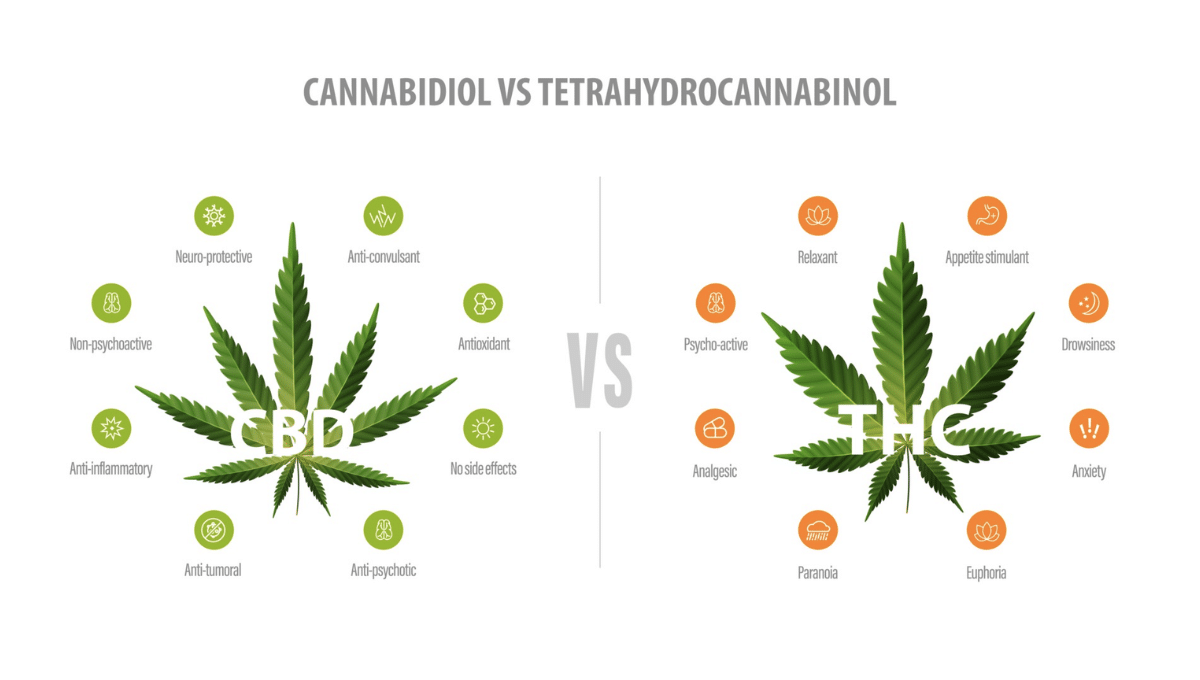The Difference Between CBD and THC
Presently, CBD (cannabidiol) versus THC (tetrahydrocannabinol) is an intriguing discussion topic. Both of them are natural compounds extracted from the same plant–Cannabis Sativa. Therefore, the question arises: How are CBD and THC different?
CBD and THC are the most crucial and commonly known cannabinoids found in the cannabis plant. CBD and THC are produced by both cannabis and hemp plants. However, Hemp has a higher concentration of CBD while Cannabis has a higher concentration of THC.
CBD and THC both comprise a similar chemical composition- 21 carbon atoms, 30 hydrogen atoms, and two atoms of oxygen. But the difference is that they don’t have a similar chemical composition, and the human body perceives them as different compounds. These mixtures combine together with synapses in the brain influencing things like temperament, pain, sleep, and memory.
Chemical structure of CBD vs. THC
CBD and THC have the same molecular structure as each other: 21 carbon atoms, 30 hydrogen atoms, and 2 oxygen atoms. The different impacts on your body are due to a minor change in how the atoms are organized.
CBD and THC are chemically similar to the endocannabinoids found in your body. They’ll be able to engage with your cannabinoid receptors as a result of this.
The release of neurotransmitters in your brain is affected by the connection. Neurotransmitters are substances that convey messages between cells and play a part in a variety of functions, including pain, immunological function, stress, and sleep, to mention a few.
THC vs. CBD: Psychoactive Ingredients
CBD and THC have different psychotropic effects despite their comparable chemical makeup. CBD has a psychotropic effect, but not in the same way as THC does. It does not create the same high as THC. CBD has been demonstrated to aid in the treatment of anxiety, depression, and seizures.
THC binds to the brain’s cannabinoid 1 (CB1) receptors. It gives you a high or a feeling of exhilaration. CBD binds to CB1 receptors very weakly, if at all. CBD requires THC to bind to the CB1 receptor, which can help minimise some of THC’s undesirable psychotropic effects like euphoria and sleepiness.
What are their origins?
Marijuana contains both CBD and THC. When a person consumes a CBD-dominant medical marijuana product, however, they are consuming CBD derived from hemp, which is closely related to marijuana. THC comes from the marijuana plant, and it is extracted from there.
Ways of Consumption
Oils of CBD and THC are accessible.
Many people prefer to smoke or vape marijuana or CBD, however for persons with specific medical issues, this may not be possible.
CBD can be found in a variety of forms. These are some of them:
- gels
- supplements
- gummies
- oils
THC can also come in different forms, including:
- smokable products
- oils
- tinctures
- edibles, such as brownies
- capsules
Drug Evaluation
Because most drug tests check for molecules that are related to THC, you should anticipate THC to show up on a screen.
Is THC present in CBD?
Yes, to put it succinctly. THC can be found in trace levels in CBD products, up to 0.3 percent. Despite the fact that such a small amount would never be enough to cause any of the psychoactive side effects, it will almost certainly show up on a drug test.
Conclusion
Cannabinoids like CBD and THC are found in marijuana. Though they may be used to treat the same conditions, the most significant difference is that THC produces a high, whilst CBD does not. Before purchasing and using CBD or THC, it is critical that consumers familiarise themselves with local legislation.
THC and CBD are both derived from the cannabis plant. However, these two molecules have significant features that set them apart. THC is renowned for its high-feeling or psychoactive effects, but CBD is known for its health advantages. Before using either, consult your doctor and think about how they might interact with other medications you’re taking.

